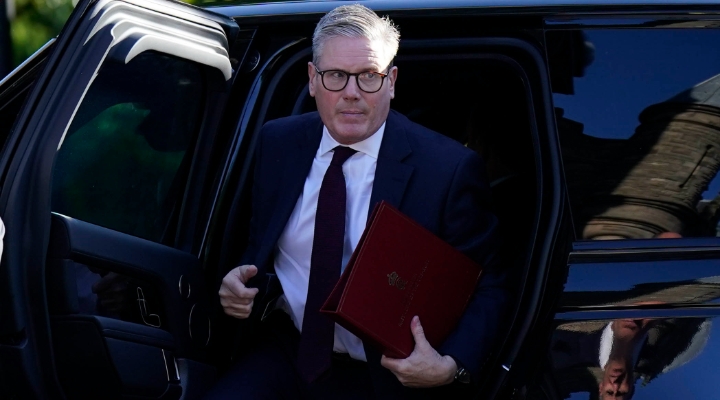
Keir Starmer has chosen his cabinet, held his first press conference, and had his first conference call with US president Joe Biden. But before all that happened, UK's new prime minister was already promising a politics that treads "more lightly" on people's lives.
Little wonder, then, that retail and professional investors alike are holding their breaths to see how Thursday's Labour landslide will impact their wallets and portfolios.
"Although Labour's manifesto was relatively light on detail, its 'Plan for Growth' document published in January provides an insight into what the key areas of focus are likely to be for the new government," Tom Selby, director of public policy at AJ Bell said in a note.
So what will Keir Starmer – and his chancellor Rachel Reeves – do next?
Mansion House Reforms: Here to Stay
Among their priorities could be a review of UK pensions with the aim of unlocking more private investment in UK PLC. That means, in all likeliness, that Jeremy Hunt's "Mansion House" agenda will now continue.
"According to Labour, at the turn of the century, UK pension funds and insurers held 39% of shares listed on the London Stock Exchange. By 2020, they held just 4%," Selby said.
"Clearly any shift in asset allocation by these schemes will need to be done in a way that doesn’t harm members' interests but given the amount of money sloshing around in defined benefit schemes, even relatively small changes could make a sizeable difference to the UK economy."
Mary Cahani, director of UK pensions at Invesco, also agrees Labour is unlikely to reverse the work done by the Conservative Party on pension reform. That said, she predicts pension taxation will return to the spotlight as a source of funding for other government policies.
"There could be a review of pension tax relief or annual allowances subject to such relief. However, it has been reported that Labour has ruled out reintroducing the Lifetime Allowance that was abolished by the Conservatives earlier this year," she said in a note.
"Another option could be to review the tax-free lump sum, but this might not be received well by the public."
According to pension freedom rules set up by the coalition government in 2014, savers can take 25% of any private pension pot as a tax-free lump sum. It's a system that has proven almost universally popular, and one which the Labour Party under Ed Miliband and Jeremy Corbyn struggled to oppose.
But just as those pension freedoms begged questions about public access to financial advice, the pressure today to improve consumer financial literacy and confidence has not disappeared.
"The 'Targeted support' model represents a practical response to the advice gap identified after the Retail Distribution Review," Cahini said.
"This model acknowledges that consumers facing complex financial decisions may not always want or be able to access regulated financial advice, and we believe it would significantly improve the current situation where consumers may receive no professional support at all."
This model could also support savers in the "accumulation" phase, and could provide consumers with the ability to make decisions about their pension funds at retirement with professional guidance, she said.
Selby also suspects Labour's fresh mandate could be an opportunity to reform individual savings accounts (ISAs). At the moment, there are six different types of ISA. Some think that is just too many, and that simplifying the system would give savers more freedom to move between cash and investments in one tax wrapper.
"As a first step, the next government should look at merging cash and stocks and shares ISAs, the two main ISA products used by investors," Selby said in a note.
"This move would make it simpler for investors to shift between cash and investments and move us towards a world where investments are simply a feature of ISAs, rather than a defining characteristic."
In addition, Starmer's government could increase the ISA allowance from £20,000 to £25,000 and abolish the "British ISA" proposal announced by former chancellor Jeremy Hunt at the Budget earlier this year.
Non-Dom Knock-On: How Will Labour Raise Tax Cash?
However, Yazmin Boden, partner at wealth management firm GSB Wealth, is concerned about changes Labour might make to the taxation of "non-domiciled" UK citizens.
Until recently, UK residents with permanent homes outside the UK paid no tax on overseas income despite working and living in the UK itself.
The topic is so controversial Jeremy Hunt himself announced a ban on the status, which has previously been used by businessman Roman Abramovich, former Bank of England governor Mark Carney, and former prime minister Rishi Sunak's wife Akshata Murty.
Labour too has supported a ban, but there are still questions over the consequences.
"The proposed changes to the non-dom taxation space will likely present a knock-on effect to the inheritance tax regime for UK domiciled individuals living outside the UK," Boden said.
In her view, the proposed changes would discourage wealthy individuals from living in the UK altogether.
Jason Hollands, managing director of investment platform Bestinvest, also agrees inheritance tax and pension tax reliefs could now be vulnerable because Labour has already pledged not to increase income tax, VAT, national insurance, or corporation tax.
Indeed, Labour is going to have find ways of raising tax revenue somewhere.
"Parliamentary dominance is one thing, but as Liz Truss and Kwasi Kwarteng discovered with their fateful mini-Budget, maintaining credibility with the financial markets is vital too," Hollands said.
"Having carefully nurtured relationships with the City and business community, Keir Starmer and Rachel Reeves will be mindful of the need to build confidence with the financial markets," he said.
"In the near term at least, I would expect Labour to stick to the policies set out in the campaign rather than spring surprise, radical new ones out of a hat."










.jpg)

















